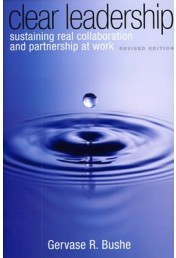Clear Leadership : Sustaining Real Collaboration and Partnership at Work
Gervase Bushe
Hidden agendas, unresolved conflicts, crucial issues never discussed_these examples of drama in the office are what the author calls "interpersonal mush." Conflicts or issues can dominate the workplace and hamper honest communication.
ISBN 9780891063827 / Nicholas Brealey / 2010 / 2de / 290p. / €26.95 / nu €19.95pb /
Clear Leadership : Sustaining Real Collaboration and Partnership at Work
Gervase Bushe
Hidden agendas, unresolved conflicts, crucial issues never discussed_these examples of drama in the office are what the author calls "interpersonal mush." Conflicts or issues can dominate the workplace and hamper honest communication.
ISBN 9780891063827 / Nicholas Brealey / 2010 / 2de / 290p. / €26.95 / nu €19.95pb /
